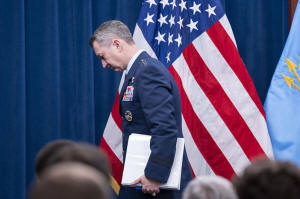Iran's top diplomat says talks with US 'complicated' by American strike
on nuclear sites
[June 27, 2025]
By DAVID RISING
DUBAI, United Arab Emirates (AP) — Iran's top diplomat said the
possibility of new negotiations with the United States on his country's
nuclear program has been “complicated” by the American attack on three
of the sites, which he conceded caused “serious damage."
The U.S. was one of the parties to the 2015 nuclear deal in which Iran
agreed to limits on its uranium enrichment program in exchange for
sanctions relief and other benefits.
That deal unraveled after U.S. President Donald Trump pulled the U.S.
out unilaterally during his first term. Trump has suggested he is
interested in new talks with Iran and said the two sides would meet next
week.
In an interview on Iranian state television broadcast late Thursday,
Foreign Minister Abbas Araghchi left open the possibility that his
country would again enter talks on its nuclear program, but suggested it
would not be anytime soon.
“No agreement has been made for resuming the negotiations,” he said. “No
time has been set, no promise has been made, and we haven't even talked
about restarting the talks.”
The American decision to intervene militarily “made it more complicated
and more difficult” for talks on Iran’s nuclear program, Araghchi said.
In Friday prayers, many imams stressed Supreme Leader Ayatollah Ali
Khamenei’s message from the day before that the war had been a victory
for Iran.

Cleric Hamzeh Khalili, who also is the deputy chief justice of Iran,
vowed during a prayer service in Tehran that the courts would prosecute
people accused of spying for Israel “in a special way.”
During the war with Israel, Iran hanged several people who it already
had in custody on espionage charges, sparking fears from activists that
it could conduct a wave of executions after the conflict ended.
Authorities reportedly have detained dozens in various cities on the
charge of cooperation with Israel.
Israel attacked Iran on June 13, targeting its nuclear sites, defense
systems, high-ranking military officials and atomic scientists in
relentless attacks.
In 12 days of strikes, Israel said it killed some 30 Iranian commanders
and 11 nuclear scientists, while hitting eight nuclear-related
facilities and more than 720 military infrastructure sites. More than
1,000 people were killed, including at least 417 civilians, according to
the Washington-based Human Rights Activists group.
Iran fired more than 550 ballistic missiles at Israel, most of which
were intercepted but those that got through caused damage in many areas
and killed 28 people.
[to top of second column]
|

Joint Chiefs Chairman Gen. Dan Caine steps away from the podium
following a news conference at the Pentagon, Thursday, June 26, 2025
in Washington. (AP Photo/Kevin Wolf)

Israeli military spokesperson Brig. Gen Effie Defrin said Friday
that in some areas it had exceeded its operational goals, but needed
to remain vigilant.
“We are under no illusion, the enemy has not changed its
intentions,” he said.
The U.S. stepped in on Sunday to hit Iran's three most important
strikes with a wave of cruise missiles and bunker-buster bombs
dropped by B-2 bombers, designed to penetrate deep into the ground
to damage the heavily-fortified targets. Iran, in retaliation, fired
missiles at a U.S. base in Qatar on Monday but caused no known
casualties.
Trump said the American attacks “completely and fully obliterated”
Iran's nuclear program, though Khamenei on Thursday accused the U.S.
president of exaggerating the damage, saying the strikes did not
“achieve anything significant.”
There has been speculation that Iran moved much of its
highly-enriched uranium before the strikes, something that it told
the U.N. nuclear watchdog, the International Atomic Energy Agency,
that it planned to do.
Even if that turns out to be true, IAEA Director Rafael Grossi told
Radio France International that the damage done to the Fordo site,
which was built into a mountain, “is very, very, very considerable.”
Among other things, he said, centrifuges are “quite precise
machines” and it's “not possible” that the concussion from multiple
30,000-pound bombs would not have caused “important physical
damage.”
“These centrifuges are no longer operational,” he said.

Araghchi himself acknowledged “the level of damage is high, and it’s
serious damage.”
He added that Iran had not yet decided whether to allow in IAEA
inspectors to assess the damage, but they would be kept out “for the
time being.”
___
Julia Frankel in Jerusalem contributed to this story.
All contents © copyright 2025 Associated Press. All rights reserved |